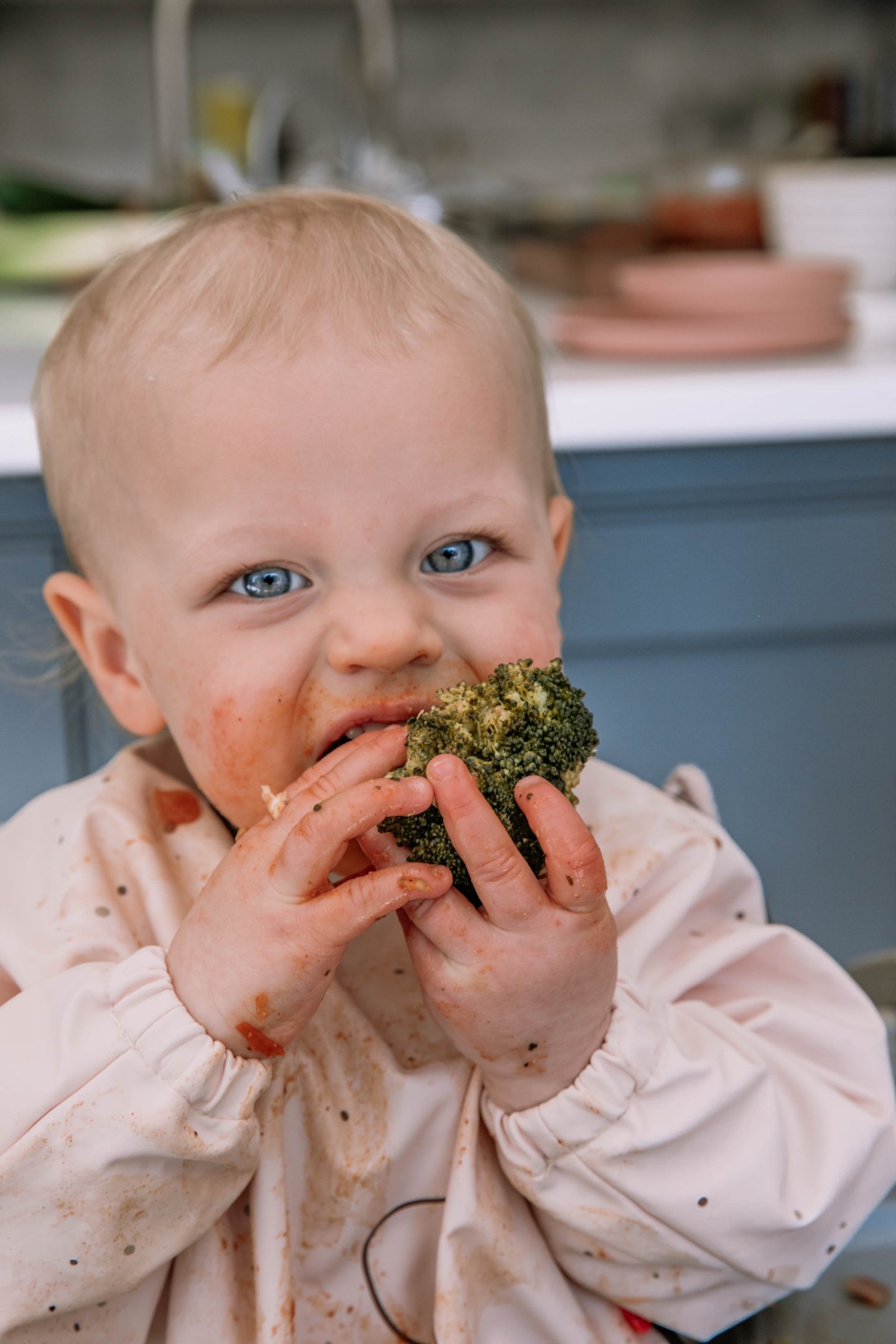
Mary van der Westhuizen a weaning specialist & registered nutritionist has very kindly written this blog post to help with underlying principle for an optimum diet for our little ones.
There are lots of blogs and articles out there on how and when to introduce your baby to solids. These practical aspects of feeding your baby are really important to ensure that you and your baby enjoy a safe, healthy and happy weaning journey. As a quick recap, the NHS recommends that babies are weaned at around 6 months of age.
However babies are all different and the age that babies are developmentally ready for solid foods can vary. Many parents find their babies are ready for solids before the age of six months. It’s good to wait to wean your baby until they are showing signs that they are ready: – they will usually be able to sit up well with limited/minimal support and be able to hold their neck steady; they’ll be able to swallow food and will take in more food than they push out; they’ll usually have good hand-eye-mouth coordination so that they can pick up food and put it in their mouth.
First tastes:
It’s a brilliant idea to spend the first few weeks of weaning focussing on introducing individual vegetables to your baby so that they become accustomed to vegetables- and their often bitter tastes – before moving on to fruits and other more readily palatable flavours. An optimum diet: For this blog we thought we’d take a slightly different focus from the usual step-by-step guide to weaning. We’re going to look at the underlying principles of an optimum diet for a child once weaning is established and you’re into the realm of more complete meals for your baby (from around 8-9 months of age). Knowing these principles of nutrition will not only support your child towards healthy growth and development but will also encourage positive eating habits for life. There is so much to discuss when it comes to optimum nutrition for children – we could go on forever -so we thought we’d limit ourselves to our top five tips! We hope you find this information interesting and helpful to consider on your weaning journey and beyond.
1. VARIETY OF FOODS
Try to introduce your baby to lots of different foods and a range of fruit and veg (have in mind a rainbow), especially during the first few months of the weaning process. By giving your baby a varied diet you’ll be helping your baby to: – consume a variety of nutrients which will help your baby’s body and mind to function optimally. – receive a variety of fibre sources which is one of the best ways to feed your baby’s beneficial gut bacteria. – reduce the chance of developing into a fussy eater. Studies have shown that if we can introduce our children to a variety of textures, tastes and colours early on in the weaning process and we continue this into childhood then we’re helping to encourage a positive, receptive attitude to new foods.
2. PLANT-BASED FOODS
Aim to offer your children plenty of plant-based foods: vegetables, fruits, pulses, wholegrain carbohydrates (eg quinoa, brown rice, brown bread), legumes, nuts*. These are brilliant because they are: – nutrient dense foods so they provide a range of minerals, vitamins and phytochemicals that your baby needs to thrive. – include loads of fibre which is important for cardiovascular health and healthy digestion (although watch your baby for loose stools and tummy discomfort to check they aren’t getting too much fibre at any point).
3. PROTEIN
Protein is needed for every cell within the body for growth, development and repair. As well as meat, fish and eggs, there are excellent vegan sources of amino acids (the building blocks of protein). These include legumes (lentils, peas, chickpeas, any beans, soybeans, and peanuts), hemp seeds, chia seeds, quinoa, nut butters, nuts*. – It’s important that a variety of protein sources are consumed so that our baby’s bodies receive the complete range of amino acids essential for optimum growth. – Protein helps to stabilise blood sugar levels; this encourages our baby to feel full and happy for longer between meals.
4. OMEGA-3 RICH FOODS
Omega-3 rich fatty acids are really important for optimum brain development, immunity and eye health. We can get these fats from oily fish (including salmon, trout, sardines, tuna), pumpkin seeds, walnuts*, algae, hemp, chia and flaxseed. Our body cant make these fats so our children need to get them daily from the food we give them (ideally twice/week from fish and the other days from plant sources). These beneficial fats: – help to stabilise blood sugar levels – provide fuel for a healthy brain and gut – are important for the absorption of fat soluble vitamins N.B: The body needs to work hard to convert the plant version of essential fatty acids (ALA) into the more active, anti-inflammatory form of essential fatty acids (EPA and DHA) that we can get from fish. When offering your baby plant sources of omega-3 fatty acids, try to also offer zinc-rich foods (e.g. nuts*, seeds, lentils, wholegrains, chicken, beef) to help the body convert these ALA omega-3s to their more active form.
5. IRON
There are loads of vitamins and minerals that could be singled out for their importance in a child’s development. Iron is worthy of note here not only for its vital contribution to healthy formation of red blood cells and optimum energy levels but also because it’s helpful to be aware that the way in which we consume iron-rich foods influences how much iron we absorb from them. As well as meat, fish and eggs, green leafy veg and legumes (i.e. lentils, peas, chickpeas, beans, soybeans and peanuts*) are excellent sources of iron. Our children need plenty of iron-rich foods as they grow. There are a few things for consideration to ensure optimum absorption of iron: – Iron from plant sources is less bioavailable than iron found in meat. When eating plant sources of iron, try to combine with vitamin C-rich foods. Vitamin C helps the absorption of iron which comes from plant sources. – There is some evidence that calcium interferes with iron absorption so over time (it takes a while for babies to adapt to this change so it won’t happen overnight) try to encourage your child to drink filtered water with their iron-rich foods instead of milk.
For more tips, get in touch with Mary @maryvanderwesthuizen or read her blog posts at www.maryvdw.com.
* Subject to the below, you can introduce your baby to common allergens (including nuts, sesame seeds, eggs, dairy, wheat, gluten, fish) once they are 6 months of age. There is evidence that early introduction of allergens to your baby (from 6 months to 12 months) can be beneficial to your baby. When introducing your baby to allergens, give them tiny amounts of the allergen (eg a teaspoon of ground peanut butter), one allergen at a time and leave three day intervals between the introduction of each allergen (so you can check for any reactions). Once your baby has shown that they don’t react to an allergen it’s a good idea to continue offering them food containing that allergen twice each week to encourage tolerance. Please check with your GP before introducing your baby to allergens if your baby has severe eczema, any other allergies and/or a family history of allergies.

